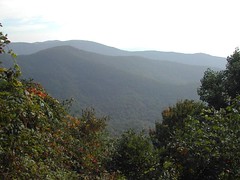(An occasional reminiscence on the events of 1968)Since Dr. Martin Luther King's murder in April, investigators had been following a trail of a man who seemed to have been following King, and went by the name of Eric Stavro Galt. Although information linked him to King's murder in Memphis, it was three months before he was finally caught.
Police in London arrested him June 8 at Heathrow Airport, where he was trying to leave the UK with a Canadian passport under the name of Ramon George Sneyd. James Earl Ray was extradited to Tennessee and charged with King's assassination. He would confess in 1969 and be sentenced to 99 years in prison. He later recanted the confession and was supported in his effort for a retrial by King's family.
40 years later questions about James Earl Ray linger, Atlanta Journal Constitution.On June 10, Gen. Creighton Abrams replaced William Westmoreland as military commander in Vietnam.
At Walter Reed Army Hospital, former president Dwight D. Eisenhower was hospitalized since a late April heart attack in California. He had another attack on June 16.
On June 19, president Johnson signed the Omnibus Crime Control and Safe Streets Act of 1968, passed in reaction to increasing crime rates and the last few year's urban riots. Among the provisions of this law, first time restrictions on purchase of handguns.
Title 3 provided guidelines for wiretapping by government agencies, designed to protect individuals from government snooping, but it carried a clause allowing wiretapping for 'national security', something the coming Nixon administration would seize on. Johnson expressed dismay at the provision, saying the nation
'had taken a dangerous step' that could lead to
'producing a nation of snoopers bending through the keyholes of the homes and offices in America, spying on our neighbors' but signed the bill anyway.
On June 22, Supreme Court chief justice Earl Warren submitted his retirement; he would leave as soon as a replacement was approved, before a new president (likely Nixon) would take power. Warren had headed the court for 15 years and had headed the commission that reported on John F. Kennedy's assassination. A few days later, president Johnson nominated his longtime friend and current Supreme Court justice Abe Fortas to replace Warren as chief. Johnson also nominated a Texas crony, former congressman and judge Homer Thornberry, to replace Fortas.
France remained unstable, with ongoing protest marches and a strikes at industrial facilities including Renault, Peugeot, and Citroen factories. On June 11 a riot at the Paris barricades resulted in 70 injuries and 400 arrests. On June 16 police removed the last 2000 students from the Sorbonne. By the 18th, workers were beginning to return to their jobs, and prime minister Georges Pompidou announced an end to the crisis. In the June 23 election, huge victories were scored by the centrist Gaullist party, with losses for the socialist and leftist factions. The left would lose even further in the June 30 elections.
At Resurrection City in Washington, the mood was brutal. Uniformed 'Tent City Rangers' tried to keep order couldn't restrain the gang-like 'marshalls' who erratically enforced entrance to the compound and who ranged through the city at night. The SCLC's Ralph Abernathy was stricken by criticism of the marchers and of his staying outside of the camp many nights, and blamed it on the American culture that had created 'a monster in the ghetto'.
Despite the problems, the National Park Service extended the camp's permit from June 16 to June 24. 50,000 people arrived for the 'Solidarity Day' demonstration on June 19, 'Juneteenth'. The next night several youths skirmished with police officers, who responded with tear gas, outside the encampment, and began stoning cars along Independence Avenue and other nearby streets.
Three nights later a similar incident resulted in 'clouds of tear gas' rolling through Resurrection City, where the few remaining protesters ran from their tents toward the Washington Monument. On the morning of June 24, 1000 police arrived to close Resurrection City down. 115 people remaining in the camp were arrested as they sang freedom songs; 200 more, including Reverend Abernathy, would be arrested later on Capitol Hill. Park officials prepared to bulldoze the camp.

During the day, several incidents occurred in areas of DC previously destroyed by the April riots; it looked like another riot was coming. A curfew was called that evening. A city in shock was in shock once again, but calm was restored fairly quickly.
At the Washington Post, I was getting to know some of the Post's reporters, mostly those from the Metro Desk who covered the city. They tended to need local story background more, so spent lots of time in the library. They were young and talented and many would go on to do great things: Len Downie (who just announced his retirement after years as the Post's executive editor, suceeding Bradlee), Robert Kaiser, Bob Maynard, Carl Bernstein, Jim Hoagland, Richard Cohen, Paul Valentine, Marty Weil, Paul Levey, Glegg Watson, Hollie West, Stuart Auerbach, William Raspberry, Leon Dash, Ivan Brandon, Carol Honsa, Susan Jacoby, and lots more.
I was impressed with how they covered the April riots. Now I watched them covering another huge story under personal danger. I particularly remember seeing Paul Valentine coming in to the newsroom, having been directly hit with tear gas and stinking of it, his face red and eyes watering so badly, we feared for his health. I was developing a huge respect for journalists and the work they did.
On the cover of Time that month: The Gun in America, Aretha Franklin, Robert F. Kennedy, and graduates.
Listening to:
United States of America.
Taj Mahal. New friends from the Post library were listening to folk/country rock, and I was getting hooked on their music: The Byrds, Buffalo Springfield, Jesse Colin Young's Youngbloods...Dylan, of course. My love of British bands continued with new albums from Cream, The Who.
(Resurrection City reference:
Ten Blocks from the White House, Washington Post staff.)
Labels: 1968, history, washington post







